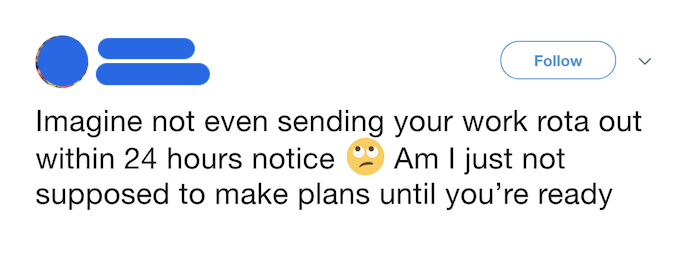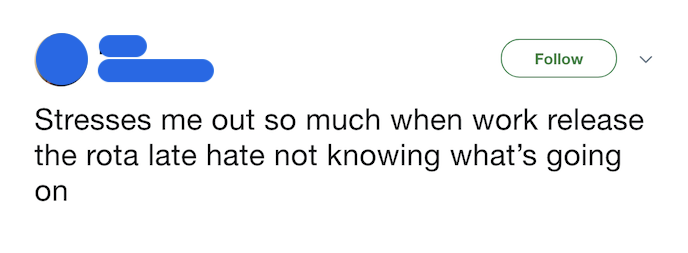Why keeping your staff waiting for the rota is bad for business [Rota Crimes]

They may not be the most glamorous part of running a business, but your staff rotas can have a big effect on the course of your — and your staff's — workday.
Without a clear, carefully planned rota, it's easy for things to start falling apart. Schedule too many staff, and you end up paying people to stand around; rota on too few employees, and your customers won't get the level of service they demand.
Factor in things like employees calling in sick, staff availability, and the small matter of annual leave, and you have a lot to think about when planning the work rota.
It's not just managers who struggle with the rota, however — rotas are a frequent source of stress, frustration and confusion for employees, too.
In fact, managers keeping staff waiting for the rota until the very last minute is one of the most common complaints you'll hear from UK workers — and it's one that can spell trouble not just for them, but for your entire business...
The complaint
Leaving the rota until the last minute can have its advantages. For hospitality businesses especially, finalising the rota just before it's needed means you'll have a better idea of demand and the number of staff you'll need on a given shift.
But late rotas can also make life miserable for your staff — and have a knock-on effect for your business.
Without knowing their upcoming work schedule, your staff are unable to plan almost any part their personal lives — whether it's a night out with friends, when they'll have time to study, or the days they'll need to organise childcare — for the week or month ahead. It's terrible for morale, and means your staff will feel that their time isn't valued.
In fact, the only thing more annoying for staff than a late rota is when their boss changes the work rota at the last minute without telling them.
To say this is a common problem would be an understatement. Take a look at this handful of genuine tweets from frustrated staff who wish their managers would hurry up and share the schedule already:






In short, last-minute rotas are a real problem for staff, resulting in a real blow to the overall employee experience at your business.
But this can also have a huge knock-on effect for the managers and business owners...

The fallout
Even if you're prepared to deal with your staff being a bit prickly as a result of a last-minute rota, consider how much damage you could be doing to your business by making your staff wait until the night before to find out when — or even if — they'll be working.
Consistently releasing shifts at the last minute can easily result in:
- Increased lateness. Imagine finding out at 9pm on Sunday that you have to be at work by 7am on Monday. You could hardly blame your staff for showing up late when they have such short notice of their shifts.
- More admin for you. If you release the rota late, then you'll have little or no time to make changes when someone inevitably tells you that there's a shift they can't make, or if there's a staff holiday that you approved but forgot to mark on the rota.
- Low morale. You want your staff to come to work in a positive frame of mind. But if you're giving them barely any notice of when they're expected to be in then it's unlikely that they'll feel particularly valued or motivated — a feeling that can easily spread to the wider team.
- Higher staff turnover. A poor employee experience can easily result in staff handing in their notice and looking for roles at businesses where they feel more valued by their employer and won't have to pester their boss for the rota.
- Damage to company reputation. Company review sites like Glassdoor have made it easier than ever for staff to share their opinions and experiences of a company with the entire world. The last thing you want when trying to hire new staff is to have a bunch of negative reviews attached to your business' name.
The solution
The good news is, all of the above scenarios are entirely avoidable.
Here's a handful of ways that you help your employees achieve a healthy work-life balance simply by adapting the way you plan and share your staff rotas.
Be prompt
The most obvious change you can make is to publish or share your upcoming rotas well in advance. If you schedule shifts a week at a time, consider releasing next week's rota at least 3-4 days before your staff actually need it.
If you schedule for a month at once, meanwhile, aim to release the rota at least one week in advance — if this is a struggle, try to figure out what the obstacles to doing so are and work to fix them.
Be consistent
Staff appreciate getting their rotas at the same time each week just as much as they appreciate getting them in advance.
Even if they only have a couple of days' notice of their shifts, knowing when the rota will be released will help them plan their week out — and means that they can give their friends and family a better idea of when they'll be able to commit to plans.
Streamline the rota distribution process
It's no good handing out printed copies of your rota one week and sharing it via WhatsApp the next. Decide on a single method for distributing your staff rotas and stick to it. That way, there'll never be any confusion about how your staff are supposed to find out when they're next in. Just be sure that the method you choose makes the rotas easily accessible to your staff.
Use past data to plan ahead
The reason so many managers wait until the last moment to publish their rotas is because it makes it easier for them to plan for the period ahead.
But, instead of waiting to see how the week looks set to play out before you start scheduling shifts, get into the habit of referring to past sales and staffing data to estimate how many employees you'll need each day and when. If you're struggling to gather or organise this information, modern staff scheduling software — which often comes with labour forecasting tools baked in — can be a big help.
Try a web-based rota solution
Because they're stored online rather than on your computer, rotas built using platforms like RotaCloud can be shared with your entire team with the click of a button. Schedules are accessible to staff anytime and anywhere via a mobile app, so they'll never have to call or email you to find out when they're next in.
Even better, any updates or changes you make to your rota after it's been published are immediately visible to your entire team, so you never have to worry about staff consulting a schedule that's out of date.
Final thoughts
As an employer, you expect your staff to be professional, punctual and courteous. It's only fair that you do the same with regard to sharing the staff rota.
By releasing shifts at the last minute, you're not only inconveniencing your staff, but also giving them the impression that their time is less valuable than yours — which could easily result in staff showing up late, coming to work with a bad attitude, or even handing in their notice.
No business can function without staff who feel happy, motivated, and valued by their employer. And while giving your team plenty of notice about their shifts isn't the only thing that will achieve that, it's a big step in the right direction.
Management advice & insights, straight to your inbox.
Enjoying the RotaCloud blog? Tell us your email address and we’ll be in touch whenever we publish a new blog.





